SRQ families endure lasting effects of opioid addiction

Nicholas Seth Craft died in 2020 at the age of 27 when he was hit by a driver on Cortez Road in the middle of the night. His mother believes it was not just the car that killed him, it was the opioid addiction that put him on the street that night.
Craft is one of the thousands of local residents who died of opioid addiction or circumstances created by it since the crisis began in 1999. The opioid crisis saw its second wave in 2010 with the rise in heroin, and a third wave in 2013 with synthetic opioids like fentanyl that are responsible for most overdose deaths today, according to the Centers for Disease Control.
The accidental death of a homeless man at 1 a.m. in Bradenton did little to generate headlines, but Craft's mother Tammy Collins, 47, said he was a beloved son and brother, and that his life reflects the complex issues that often surround opioid addiction.
"The frustrating part about opioid addiction is all they have to do is just stop," Collins said. "It's self-inflicted, and that is a part of the stigma. People think they want to live like that. No, they don't. It's a chemical reaction in their brain. It takes such a hold on their body or their mind. They're just not themselves, the chemical reaction from the opioids has taken over."
In case you missed it: Rise of fentanyl fuels opioid crisis in Manatee County
More: Moody visits Sarasota: Rise in Xylazine has made use of deadly opioids even more lethal
And: Fatal drug overdoses are on the rise in Sarasota and Manatee counties
Analysis from the CDC in early April shows there were 7,717 drug overdose deaths in Florida during the fiscal year spanning between November 2021 and 2022. That is a small 1.15% decrease from the previous year, but the state ranks second in the nation, only behind California, in total deaths during that time.
Communities across Florida are now making plans for their share of $3 billion of funding secured by the state as part of a massive multi-billion dollar lawsuit settlement between thousands of states and local governments and pharmaceutical manufacturers, distributors, and retailers. Much of the money is earmarked to help cities and counties fund efforts to address the opioid crisis that has affected local families.
Laura Williamson, a 36-year-old Venice resident, lost her brother Eric Lambrecht, a U.S. Coast Guard veteran, when he was killed in a substance abuse-related incident in 2010 at the age of 25. She now hosts an annual candlelight vigil in Venice to help families affected by substance addiction.
"My brother became a statistic to most people," Williamson said. "But I think it's so important for the community to see that people who are dying are not just some nameless, faceless, person. This is somebody's mom or dad, or somebody's brother or sister or child."
Manatee considers use for opioid settlement funds
Manatee County stands in line to receive about $43 million in funding awarded as part of settlement agreements, and county commissioners have started to research ways to allocate funds.
"Let's be honest if you've lived in Manatee County for 10 to 20 years, you have been affected in some way, shape, or form by the opioid crisis," said Manatee County Commission Chairman Kevin Van Ostenbridge.
"The opioid crisis was at its peak when I was in my 20s, not long after I got out of high school," he said. "It's affected my family. I have a cousin who lost his battle with an opioid addiction last year. It's affected I think everyone. We all have friends, I had players who I coached at Manatee High School who also lost their battle with opioid addiction."
County commissioners have indicated one possibility for funding is the creation of a transitional shelter program similar to Pinellas Hope, which has been operated by the Catholic Charities Diocese of St. Petersburg in Clearwater since 2007.
The nonprofit offers minimalistic emergency shelter, in the form of 250 tents, to help individuals transition out of homelessness. Over the years, it has expanded to offer a community center, a kitchen, meeting rooms, bathrooms, a laundry room, and efficiency apartments.
Commissioners have said a similar facility would help Manatee County and Bradenton address homelessness in a comprehensive way by creating a place where homeless residents can find transitional housing and assistance connecting with wraparound services.
"Manatee County has been disproportionately impacted by the opioid crisis, and many victims of the opioid crisis have found themselves homeless as a result of their addiction," Van Ostenbridge said. "I'm hoping that I can make contact with a local organization that may be willing to operate it."
Centerstone offers support to SRQ families
Many local families have petitioned intervention under the authority of the Marchman Act to have loved ones struggling with addiction admitted for assessment or treatment against their will.
The act is similar to the Baker Act, which instead applies to individuals someone suffering from a mental illness who may cause harm to themselves or others but are unwilling to seek treatment. Although the Baker Act is meant for mental health, people who suffer from drug abuse along with other mental illnesses can still be committed.
Centerstone is the designated Baker Act receiving facility in Manatee County and serves the entire region.
"The common thread that runs through a lot of families is the behavioral health issues of the children that are impacted," said Gemma Clayson, director of community programs at Centerstone.
"A lot of times we see frequent, frequent, Baker Acts that are happening within these families, and parents that are just unaware of how to manage, how to cope, with the mental health needs of their children," she said. "Whether it be related to substance use issues or not. Sometimes they go hand in hand."
There have been 268 Baker Act filings, and 54 Marchman Act filings, so far this year in Manatee County as of March, according to Manatee County Clerk of the Circuit Court statistics.
The number of Baker and Marchman Act filings has remained steady in recent years. Since 2018, there has been a range of 620 to 647 Baker Act filings and between 104 to 147 Marchman Act filings per year in Manatee County.
Clayson said her work at Centerstone is focused on supporting entire family units, and not just the recovering individual, to stop the cycle of addiction.
"Substances affect the whole family," Clayson said. "If you have a caregiver that is addicted to a substance that impacts their relationship with their child, which is impacting that attachment relationship with them, it affects brain development and the ability to control their emotions, and the earlier that happens the more detrimental it becomes for that child."
Addicted as a teen
Craft had an accident when he was 15 years old handling a firearm at his grandparent's farm in Alabama while trying to scare some crows. He accidentally shot himself in the hand, leading to painful surgeries and the eventual loss of his thumb and half of two other fingers.
"He had to go through multiple surgeries and physical therapy," Collins said. "He was prescribed opioids along with some other medicines, and really I just assumed the doctors knew what they were doing."
"But after the pain should have subsided, the medicine was gone, he would still want it, he would still ask for it," she said. "When he realized we weren't going to help him get it and the doctors were not going to give him more, he started looking for it in other things. Other places, in the street, other pills. It was just this constant need to be high."
The family eventually moved to Manatee County, where Craft had little trouble finding access to opioids.
"I had no idea how many opioids were on the streets, but when he got here, he found them and he found them fast," she said. "I'd send him to his grandparents in Alabama to get him away from it. Well, he'd come back."
Craft struggled with opioid addiction for more than a decade leading up to his death in 2020. He became distant and at times clashed with Collins over his drug use.
"I was so angry at him, instead of just giving him the love and constant reinforcement that he needed, I would just be so mad because I couldn't understand why he was choosing this, and I didn't know how to help him," she said.
At times, Collins leveraged the Marchman Act and Baker Act to enter him into court-mandated treatment and sought other avenues such as support groups.
She had been out looking for him the day he died so that he could be taken in for treatment at Centerstone for three days, but could not find him. Late that night, Collins heard a knock at her door, and she immediately knew something was wrong.
"He was just running, he ran across the street, then he ran back across the street, then he ran across the street again," she said. "I only know that because of the 911 calls, there were three. The first two were drivers who said 'I almost hit this kid, he's running in the road,' and the third one said, 'I just hit something, I think it was a dog.'"
Families supporting families in the wake of addiction and loss

It took just one Xanax to hook Eric Lambrecht, a 22-year-old U.S. Coast Guard veteran, into a struggle with substance abuse and opioid addiction that would end with his death three years later.
Eric had social anxiety and started experimenting with drugs after accepting Xanax at a party. Benzodiazepines like Xanax can increase the risk of overdose when combined with opioid use. He was killed at the age of 25 when he was injected with a lethal dose of methadone by another addict in 2010.
"He felt uncomfortable in large group situations," his mother, Laura Williamson, said. "He was at a party and someone offered him a Xanax just to take the edge off of it, and after that, he was hooked. He was about 20, he struggled about three years before he died."
"I have three kids that will never know their uncle, I have parents who will never be the same from losing a child," she said. "Honestly, I'll never be the same. But I try to use that to help the community."
The loss motivated Williamson to host the annual Venice Candlelight Vigil since 2013, with the hope to inspire those who are using opioids to seek help.
"Those first few years after he died I had a lot of guilt and a lot of questions," she said. "It wasn't talked about, you can imagine the shame and stigma involved with it now, thirteen years ago it was even worse. Trying to find help for him was a joke. That's improved over the years, but help back then was almost nonexistent."
This article originally appeared on Sarasota Herald-Tribune: SRQ families endure the lasting effects of opioid addiction

